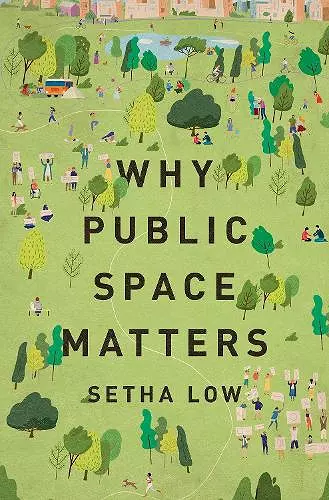Why Public Space Matters
Format:Hardback
Publisher:Oxford University Press Inc
Published:1st Mar '23
Should be back in stock very soon

Drawing from decades of research, Setha Low shows how public space contributes to a flourishing society through promoting social justice and democratic practices. Thriving public spaces also enhance creativity, health, urban resilience, and environmental sustainability. Yet more than ever, public spaces across the world are threatened by urban development, privatization and neglect. Public spaces -- where people from all walks of life play, work, meet, talk, read, think, debate, and protest -- are vital to a healthy civic life. And, as the eminent scholar of public space Setha Low argues in Why Public Space Matters, even fleeting moments of visibility and encounter in these spaces tend to foster a broader worldview and our willingness to accept difference. Such experiences also enhance flexible thinking, problem solving, creativity, and inclusiveness. There are many such spaces, but they all enhance social life. Sidewalks and plazas offer business opportunities for small-scale entrepreneurs who cannot afford store space. Public parks have long provided major cultural attractions, from plays to concerts, at little or no cost to the public. Central squares have a storied tradition as arenas for demonstrations and political protests. Parks and waterways create sustainable greenways, and during disasters, all manner of public spaces become centers for food delivery and shelter. To illustrate their value, Low draws from decades of research in public spaces across the Americas, from New York to Costa Rica. Yet we are losing public spaces to accelerated urban development and the belief that public spaces are expendable. Just as important is the broad-scale and ongoing privatization of public space by corporate actors. Low explores why public spaces matter today, how they are at risk, and what we can do about protecting these essential places that support our everyday lives. Finally, she shows how we can work to promote public space protection and expansion at both the grassroots and global levels. Throughout, she focuses on real public spaces and the people who use them in cities and regions across the Americas, from New Jersey to Costa Rica. A powerful, defining statement on a foundational contributor to healthy civic life, Low's book not only details what we are at risk of losing, but shows us how we can not only stop the losses, but work to expand the number of spaces available to the public.
Building on her groundbreaking earlier works, Low astutely describes public spaces as 'infrastructures of inclusion and exclusion,' where people, politics and place converge and connect, opening spaces for the negotiation and contestation of new public cultures. Focusing on contemporary issues such as racial injustice, climate change, socioeconomic and class inequality, she details ways that public space contributes to the flourishing of individuals, communities, cities and societies * Julian Agyeman, Professor of Urban and Environmental Policy and Planning, Tufts University *
From social justice to ecological sustainability, decades of public space fieldwork are usefully summarized in the latest 'all things public space' from Setha Low. A must have for all students of urbanism. * Emily Talen, Professor of Urbanism, University of Chicago *
Most people, when asked their favorite memory of a city, mention public space--a plaza or a boulevard or a beach. How is it then that we understand so little about the social dynamics of places; that the designers and managers of public space seem to have so little research to support their work? In this book Setha Low sets out to fill that void. Why Public Space Matters is essential reading for anyone involved in the design, management, programming or simply the enjoyment, of public space. * David Burney, Director, Urban Placemaking and Management, Pratt Institute *
In this brilliant and inspirational book, urban ethnographer Setha Low shows us why the stakes of debates about 'public space' in the 21st century could not be more serious and socially significant. In a world where we tend to either take public space for granted or express fear of the potential dangers they might hold, Low uses her nuanced theoretical lens and a variety of compelling ethnographic examples—from New York's Jones Beach and New Jersey's Lake Welch to Hudson Historical Park, Battery Park City after 9/11, and a thoughtful analysis of how the pandemic impacted the use and sense of public space in New York City—to demonstrate that discussions about democracy and social justice should never underestimate the importance of public space for the very sustainability of human life. * John L. Jackson, Jr., Walter H. Annenberg Dean and Richard Perry University Professor, the University of Pennsylvania *
Low maintains an accessible style throughout, suitable for general readers, but the material will appeal most to expert scholars and planners. Anyone interested in public spaces will enjoy this book. * Choice *
Why Public Space Matters isn't just a celebration of public space - it is 40 years of research compiled into a comprehensive exploration of its importance...Low's blend of academic rigor and storytelling makes it accessible to a wide audience, urging us all to take action and make the most of our public spaces. * Urban Design Journal *
ISBN: 9780197543733
Dimensions: 241mm x 164mm x 31mm
Weight: 658g
336 pages